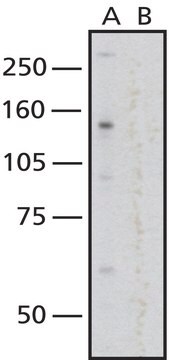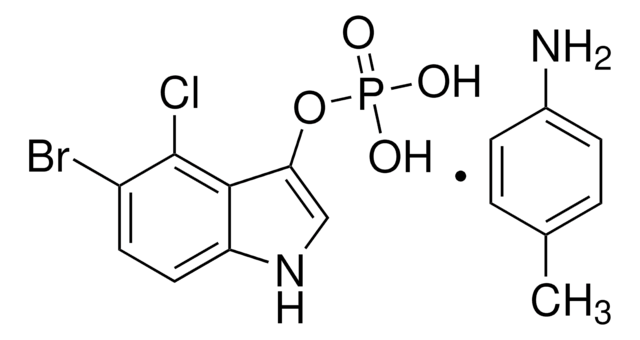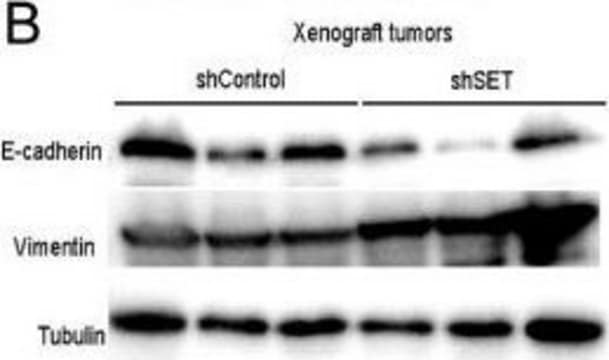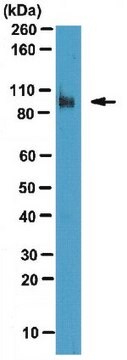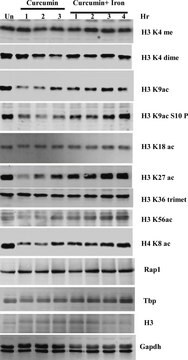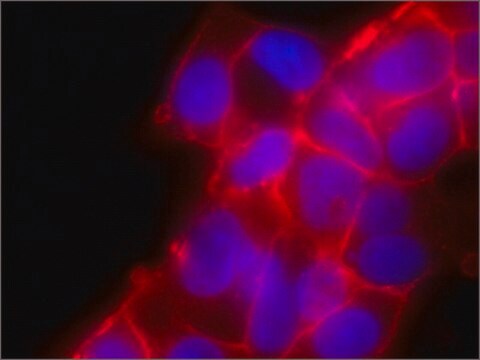おすすめの製品
由来生物
mouse
品質水準
抗体製品の状態
purified immunoglobulin
抗体製品タイプ
primary antibodies
クローン
414, monoclonal
交差性
yeast, mouse, rat, human
テクニック
electron microscopy: suitable
immunocytochemistry: suitable
immunoprecipitation (IP): suitable
western blot: suitable
アイソタイプ
IgG1κ
NCBIアクセッション番号
UniProtアクセッション番号
ターゲットの翻訳後修飾
unmodified
遺伝子情報
human ... NUP62(23636)
詳細
Nuclear pore glycoprotein p62 (UniProt P17955; also known as 62 kDa nucleoporin, Nucleoporin Nup62) is encoded by the Nup62 gene (Gene ID 65274) in rat species. The nuclear pore complex (NPC) acts as a passageway for nucleocytoplasmic transport. Soluble cargo-protein complexes navigate through the pore by binding to phenylalanine-glycine (FG)-repeat proteins attached to the channel walls. The Nup62 complex is located in the center of the NPC and contains the FG-repeat proteins Nup62, Nup54, and Nup58 associated with each other via conserved coiled-coil segments in a 1:1:1 stiochiometric ratio. The nuclear envelope breaks down during prometaphase. The disassembled nucleoporin subcomplexes act as critical regulators of various mitotic events to ensure proper chromosome segregation. Specifically, Nup62 is reported to localize to centrosomes/spindle poles, where it associates with the centrosomal proteins gamma-tubulin and hSAS-6. Nup62 is involved in the recruitment of critical proteins to the centrosome and its depletion results in mislocalization of several centrosomal components.
特異性
Clone 414 immunostained rat liver cell nuclear rim and yeast cell nuclear envelope (Aris, J.P., and Blobel, G. (1989). J. Cell Biol. 108(6):2059-2067; Davis, L.I., and Blobel, G. (1986). Cell. 45(5):699-709).
免疫原
Triton X-100 treated rat liver nuclei.
アプリケーション
Research Category
細胞シグナル伝達
細胞シグナル伝達
Research Sub Category
エピジェネティクス
エピジェネティクス
Anti-Nuclear Pore Complex Proteins Antibody, clone 414 is an antibody against Nuclear Pore Complex Proteins for use in Immunocytochemistry, Immunoprecipitation, Western Blotting, Electron Microscopy.
Immunocytochemistry Analysis: A 1:200 dilution from a representative lot immunostained NIH/3T3 cell nuclear rim.
Immunocytochemistry Analysis: A representative lot immunostained yeast nuclear envelope with a punctate and patchy pattern (Aris, J.P., and Blobel, G. (1989). J. Cell Biol. 108(6):2059-2067).
Immunocytochemistry Analysis: Representative lots detected a punctate staining pattern of Nup62 at the nuclear rim by fluorescent immunocytochemistry using 2% formaldehyde-fixed, methanol-permeabilized Buffalo rat liver (BRL) cells (Davis, L.I., and Blobel, G. (1987). Proc. Natl. Acad. Sci. U. S. A. 84(21):7552-755; Davis, L.I., and Blobel, G. (1986). Cell. 45(5):699-709).
Electron Microscopy: A representative lot immunostained yeast nuclear envelope using 3% paraformaldehyde/0.2% glutaraldehyde-fixed yeast nuclei LR White sections (Aris, J.P., and Blobel, G. (1989). J. Cell Biol. 108(6):2059-2067).
Electron Microscopy: A representative lot immunostained the pore complexes in thin sections of isolated rat liver nuclei extracted with 2% Triton X-100 and fixed with 0.05% glutaraldehyde (Davis, L.I., and Blobel, G. (1986). Cell. 45(5):699-709).
Immunoprecipitation Analysis: A representative lot immunoprecipited a ~100 kDa (p110) and a ~95 kDa (p95) protein species from yeast nuclear extract. An additional ~55 kDa protein was immunoprecipitated by clone 414 using yeast cytosolic fraction or whole cell lysate (Aris, J.P., and Blobel, G. (1989). J. Cell Biol. 108(6):2059-2067).
Immunoprecipitation Analysis: A representative lot immunoprecipitated three major GlcNAcylated prtoein species of 62, 175, and 270 kDa from SDS-solubilized pore complex-lamina extract of Buffalo rat liver (BRL) cell nuclei preparation that had been labeled with UDP-[3H]Gal by galactosyltransferase (Davis, L.I., and Blobel, G. (1987). Proc. Natl. Acad. Sci. U. S. A. 84(21):7552-755).
Immunoprecipitation Analysis: A representative lot immunoprecipitated GlcNAcylated 62 kDa protein (p62) from the SDS-solubilized pore complex-lamina extract, as well as a less glycosylated p61 cytoplasmic form from the postmitochondrial supernatant of Buffalo rat liver (BRL) cells (7552-755; Davis, L.I., and Blobel, G. (1986). Cell. 45(5):699-709).
Western Blotting Analysis: A representative lot detected a ~100 kDa (p110) and a ~95 kDa (p95) immunoreactive bands in yeast nuclear extract (Aris, J.P., and Blobel, G. (1989). J. Cell Biol. 108(6):2059-2067).
Western Blotting Analysis: A representative lot detected a ~62 kDa (p62) and a ~200 kDa target bands associated with nuclear pore complex-lamina of rat liver nuclei preparation even following sequential nucleaases, Triton X-100, and 140 mM NaCl treatments (Davis, L.I., and Blobel, G. (1986). Cell. 45(5):699-709).
Immunocytochemistry Analysis: A representative lot immunostained yeast nuclear envelope with a punctate and patchy pattern (Aris, J.P., and Blobel, G. (1989). J. Cell Biol. 108(6):2059-2067).
Immunocytochemistry Analysis: Representative lots detected a punctate staining pattern of Nup62 at the nuclear rim by fluorescent immunocytochemistry using 2% formaldehyde-fixed, methanol-permeabilized Buffalo rat liver (BRL) cells (Davis, L.I., and Blobel, G. (1987). Proc. Natl. Acad. Sci. U. S. A. 84(21):7552-755; Davis, L.I., and Blobel, G. (1986). Cell. 45(5):699-709).
Electron Microscopy: A representative lot immunostained yeast nuclear envelope using 3% paraformaldehyde/0.2% glutaraldehyde-fixed yeast nuclei LR White sections (Aris, J.P., and Blobel, G. (1989). J. Cell Biol. 108(6):2059-2067).
Electron Microscopy: A representative lot immunostained the pore complexes in thin sections of isolated rat liver nuclei extracted with 2% Triton X-100 and fixed with 0.05% glutaraldehyde (Davis, L.I., and Blobel, G. (1986). Cell. 45(5):699-709).
Immunoprecipitation Analysis: A representative lot immunoprecipited a ~100 kDa (p110) and a ~95 kDa (p95) protein species from yeast nuclear extract. An additional ~55 kDa protein was immunoprecipitated by clone 414 using yeast cytosolic fraction or whole cell lysate (Aris, J.P., and Blobel, G. (1989). J. Cell Biol. 108(6):2059-2067).
Immunoprecipitation Analysis: A representative lot immunoprecipitated three major GlcNAcylated prtoein species of 62, 175, and 270 kDa from SDS-solubilized pore complex-lamina extract of Buffalo rat liver (BRL) cell nuclei preparation that had been labeled with UDP-[3H]Gal by galactosyltransferase (Davis, L.I., and Blobel, G. (1987). Proc. Natl. Acad. Sci. U. S. A. 84(21):7552-755).
Immunoprecipitation Analysis: A representative lot immunoprecipitated GlcNAcylated 62 kDa protein (p62) from the SDS-solubilized pore complex-lamina extract, as well as a less glycosylated p61 cytoplasmic form from the postmitochondrial supernatant of Buffalo rat liver (BRL) cells (7552-755; Davis, L.I., and Blobel, G. (1986). Cell. 45(5):699-709).
Western Blotting Analysis: A representative lot detected a ~100 kDa (p110) and a ~95 kDa (p95) immunoreactive bands in yeast nuclear extract (Aris, J.P., and Blobel, G. (1989). J. Cell Biol. 108(6):2059-2067).
Western Blotting Analysis: A representative lot detected a ~62 kDa (p62) and a ~200 kDa target bands associated with nuclear pore complex-lamina of rat liver nuclei preparation even following sequential nucleaases, Triton X-100, and 140 mM NaCl treatments (Davis, L.I., and Blobel, G. (1986). Cell. 45(5):699-709).
品質
Evaluated by Immunocytochemistry in HeLa cells.
Immunocytochemistry Analysis: A 1:200 dilution of this antibody immunostained HeLa cell nuclear rim.
Immunocytochemistry Analysis: A 1:200 dilution of this antibody immunostained HeLa cell nuclear rim.
ターゲットの説明
53.40 kDa (Rat Nup62) calculated. ~62/175/270 kDa (Rat liver nuclear extract) and ~95/100 kDa (Yeast nuclear extract) reported (Aris, J.P., and Blobel, G. (1989). J. Cell Biol. 108(6):2059-2067; Davis, L.I., and Blobel, G. (1986). Cell. 45(5):699-709). Uncharacterized band(s) may appear in some lysates.
物理的形状
Protein G Purified
Format: Purified
Purified mouse monoclonal IgG1κ antibody in buffer containing 0.1 M Tris-Glycine (pH 7.4), 150 mM NaCl with 0.05% sodium azide.
保管および安定性
Stable for 1 year at 2-8°C from date of receipt.
その他情報
Concentration: Please refer to lot specific datasheet.
免責事項
Unless otherwise stated in our catalog or other company documentation accompanying the product(s), our products are intended for research use only and are not to be used for any other purpose, which includes but is not limited to, unauthorized commercial uses, in vitro diagnostic uses, ex vivo or in vivo therapeutic uses or any type of consumption or application to humans or animals.
適切な製品が見つかりませんか。
製品選択ツール.をお試しください
保管分類コード
12 - Non Combustible Liquids
WGK
WGK 1
引火点(°F)
Not applicable
引火点(℃)
Not applicable
適用法令
試験研究用途を考慮した関連法令を主に挙げております。化学物質以外については、一部の情報のみ提供しています。 製品を安全かつ合法的に使用することは、使用者の義務です。最新情報により修正される場合があります。WEBの反映には時間を要することがあるため、適宜SDSをご参照ください。
Jan Code
MABS1267:
試験成績書(COA)
製品のロット番号・バッチ番号を入力して、試験成績書(COA) を検索できます。ロット番号・バッチ番号は、製品ラベルに「Lot」または「Batch」に続いて記載されています。
Michael Sean Mauro et al.
eLife, 11 (2022-07-20)
The nuclear envelope (NE) assembles and grows from bilayer lipids produced at the endoplasmic reticulum (ER). How ER membrane incorporation coordinates with assembly of nuclear pore complexes (NPCs) to generate a functional NE is not well understood. Here, we use
ライフサイエンス、有機合成、材料科学、クロマトグラフィー、分析など、あらゆる分野の研究に経験のあるメンバーがおります。.
製品に関するお問い合わせはこちら(テクニカルサービス)